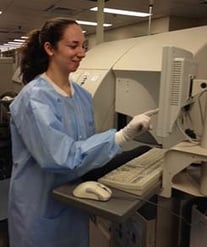 CHALLENGE
CHALLENGE
Home » Academics » Undergraduate Majors » Biology » Clinical Laboratory Science » Learning Outcomes
Biological Science
Bio/CLS Track
Program Learning Outcomes
After completing all BIO/CLS course work and clinical practicum requirements with a minimum competency of 77%, a graduate of the BIO/CLS track of the biology major will be proficient in the following entry level Learning Outcomes:
- Perform a full range of laboratory tests with accuracy and precision. This includes the ability to:
- Develop and establish procedures for collecting, processing, and analyzing specimens.
- Perform a full range of clinical laboratory tests in such areas as hematology, clinical chemistry, immunohematology, microbiology, serology/immunology, coagulation, molecular, analytical tests of body fluids and other emerging diagnostics with accuracy.
- Perform assays according to laboratory protocol and recognize factors interfering with test results and take corrective action.
- Operate equipment properly, trouble-shoot, and establish and perform preventive and corrective maintenance.
- Evaluate laboratory data results using quality control and quality assurance measures, and institute proper procedures to maintain accuracy and precision.
- Apply principles of quality assurance and quality improvement for all phases of laboratory services, such as pre-analytical, analytical, and post-analytical.
- Comply with established laboratory safety regulations and regulations governing regulatory compliance related to laboratory practice.
- Develop a sound scientific knowledge foundation that prepares them to interpret, analyze and evaluate scientific knowledge in clinical practice. The outcome includes the ability to:
- Apply scientific principles, such as physiology, immunology, biochemistry, molecular biology, genetics, microbiology, laboratory principles, and methodology to the clinical setting.
- Evaluate discrepancies that impact laboratory services by integrating and relating data generated by the various clinical laboratory departments and make corrective decisions.
- Confirm abnormal results, verifying quality control procedures, executing quality control procedures, and developing solutions to problems concerning the generation of laboratory data using interpretive algorithms.
- Apply principles of continuous assessment to all laboratory services by developing, evaluating, and selecting new techniques, instruments, and methods in terms of their usefulness and practicality within the context of a given laboratory’s personnel, equipment, space, and budgetary resources.
- Evaluate published scientific studies utilizing knowledge of research design.
- Develop professional competence. The outcome includes the ability to:
- Communicate through oral and written skills, effectively and professionally to enable consultative interactions with healthcare personnel, external relations, customer service and patients in order to function successfully as a member of the healthcare team.
- Demonstrate ethical and professional conduct with patients, laboratory personnel, health- care professionals, and the public.
- Participate in continuing education as a function of growth and maintenance of professional competence.
- Apply principles of educational methodology to educate providers and users of laboratory services.
- Apply principles and concepts of healthcare delivery systems performance improvement dynamics in relation to laboratory service, laboratory operations, financial management and human resource management of the clinical laboratory to enable cost-effective, high-quality, value-added laboratory services.
Additional program information
For additional information, please call the Office of Admissions and Financial Aid, which coordinates the admission of all students, at (610) 558-5616 or (800) 9-NEUMANN or feel free to e-mail us at neumann@neumann.edu.


.jpg?width=207&name=IMG_0209%20(1).jpg)





